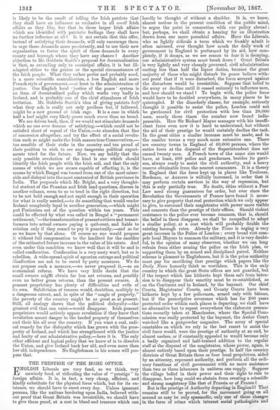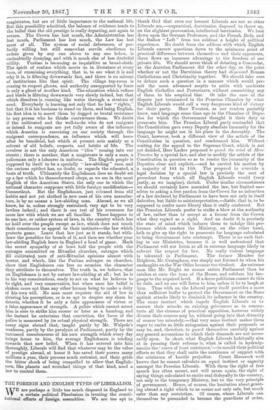THE PRESTIGE OF THE HOME OFFICE.
ENGLISH Liberals are very fond, as we think, very unwisely fond, of ridiculing the value of " prestige " in foreign affairs. It is, in fact, a very cheap, efficient, and kindly substitute for the physical force which, but for its ex- istence, we should have to exert every day. Unless ignorant persons, like the nations bordering upon India, believed with- out proof that Great Britain was irresistible, we should have to give them proof, at a cost in blood and treasure which can hardly be thought of without a shudder. It is, we know, almost useless in the present condition of the public mind, to argue the point in connection with our policy abroad ; but, perhaps, we shall obtain a hearing for an illustration drawn from our more parochial affairs. Have the Liberals, who so lightly ridicule a term which we frankly admit is often misused, ever thought how much the daily work of government in England is performed by its aid, how com- pletely, if it decays, as we see reason to fear it is decaying,. our administrative system must break down ? Great Britain is very lightly and very cheaply governed, civil administration costing less than half the liquor duties, because the great majority of those who might disturb its peace believe with- out proof that if it were disturbed, the force arrayed against the disturbers would be irresistible. Suppose that belief to die away or decline until it ceased seriously to influence men, and how should we stand ? To begin with, the police force would have to be doubled everywhere, in many places to be- quintupled. If the disorderly classes, for example, seriously- thought it possible to resist the police, London could not be garrisoned for civil protection with less than 20,000 men, nearly three times the number now found indis- pensable. How Sir Richard Mayne manages with his insuffi- cient force even now it is hard to understand, but without the aid of their prestige he would certainly decline the task. In the great cities a similar increase must be made, and in the smaller towns a very much more extensive one. There- are country towns in England of 40,000 persons, where the entire force at the disposal of the Superintendent does not exceed twenty men. A French town of the same size would have, at least, 400 police and gendarmes, besides its garri- son, always ready to assist the civil authority, and a heavy reserve obtainable from the nearest communes. It is a theory in England that the force kept up in places like Toulouse,, Bordeaux, or Auxerre is wilfully increased, in order that it may perform certain services in the way of repression, but this is only partially true. No doubt, cities without a Poor Law need strong guarantees for order, but ever since the• Revolution the Governments of France have found it neces- sary to give property that real protection which we only appear to give, to surround their magistrates with power more visible and concrete than the prestige of their offices. Should violent resistance to the police ever become common, that is, should the belief in them disappear, we shall be compelled to adopt a similar policy, at a cost which will probably double the• existing borough rates. Already the Times is urging a very great increase in the Police of London ; every bread riot com- pels local Mayors to summon the military, and it is very doubt- ful, in the opinion of many observers, whether we can long refrain from either arming the police on the Irish plan, or supporting them by an armed and disciplined patrol. Neither scheme is pleasant to Englishmen, but it is the price authority must pay for sacrificing that prestige which papers like the- Daily News honestly think so worthless. This is the only country in which the great State offices are not guarded, but if the respect which has hitherto kept them safe from intru- sion is to disappear their sanctity must be re-established, as on the Continent and in Ireland, by the bayonet. Our chief-. Courts, Magistrates' Courts, and County Courts have been hitherto kept by a few policemen, armed only with batons, but if the prescriptive reverence which has for 200 years protected order within such places is departing, we shall have- no alternative but to repeat everywhere the elaborate precau- tions recently taken at Manchester, where the Special Com- mission was really protected by the bayonet, the Assize Court watched like a gunpowder magazine. The array of special constables on which we rely in the last resort to assist the- civil force would, were the prestige of authority at an end, be almost useless, or if constantly appealed to would become only a badly organized and half-trained addition to the regular staff at the disposal of the magistrates, whose power, again, is almost entirely based upon their prestige. In half the country districts of Great Britain three or four local proprietors, aided by an attorney, represent authority, and perform all the ordi- nary functions of civil government with no more assistance- than two or three labourers in uniform can supply. Suppose the village belief in their power and their right to rule to disappear, how long could we abstain from creating a scientific and strong magistracy like that of Prussia or of France ? But is the prestige of Authority departing in England? That remains still to be proved, for the movement going on all around us may be only spasmodic, only one of those changes in the form of crime which interest social pathologists and magistrates, but are of little importance to the national life. But this possibility admitted, the balance of evidence tends to the belief that the old prestige is really departing, not again to return. The Crown has lost much, the Administration has lost much, Parliament has lost much, the Law has lost most of all. The system of social deferences, of per- fectly willing but still somewhat servile obedience to orders given by any one above to any one below, is undoubtedly decaying, and with it much else of less doubtful utility. Fustian is becoming as inquisitive as broad-cloth. The spirit of realism which meets us in literature at every turn, of examining everything, that is, to see what it is and why it is, is filtering downwards fast, and there is no solvent of institutions like that spirit. The village tap-room is ceasing to respect ghosts, and authority unsupported by force is only a ghost of another kind. The education which refines and binds is filtering downwards very slowly indeed, but that which dissolves is running like water through a stratum of sand. Everybody is learning not only that he has " rights," but that it is his business to stand on them, and being English, his first idea is to assert them by dogged or brutal resistance to any person who he thinks contravenes them. We doubt if the cultivated and the well-to-do who do not emigrate or intend to emigrate are yet fully aware of the influence which America is exercising on our society through the emigrant correspondence, an influence which will here- after be beneficial, but which at present acts mainly as a solvent of old beliefs, respects, and habits of life. The revolver is not the only American " idea " coming into our streets ; there is another, that a magistrate is only a man, a policeman only a labourer in uniform. The English people is supposed by itself to be a specially " law-abiding " race, and the curious epithet has, no doubt, as regards the educated, a basis of truth. Ultimately the Englishman does no doubt set up a law which he thenceforward obeys, as we see in the most English of the American States, the only one in which the national character reappears with little foreign modification— Connecticut. But the Englishman, just released from old habits and not yet clothed in new ones of his own manufac- ture, is by no means a law-abiding man. Abroad, as we all know, he is, unless strongly restrained, very apt to be very lawless indeed ; and there is one test of his reverence for mere law with which we are all familiar. There happens to be one law, or rather system of laws, in the country which has no hold over the people except as law, which does not touch their consciences or appeal to their instincts—the law which protects game. Leave that law just as it stands, but with- draw the penalties for breach of it, and then see whether your law-abiding English leave in England a head of game. Mark the secret sympathy of at least half the people with the outrages committed on Ritualist churches, outrages which fill cultivated men of anti-Ritualist opinions almost with horror, and which, like the Puritan outrages on churches, show that Englishmen can lose on occasion the character they, attribute to themselves. The truth is, we believe, that an Englishman is not by nature law-abiding at all ; but he is in his way conscientious, ready to act on what he believes to be right, and very conservative, but when once his belief is shaken more apt than any other human being to make a deity of his own will. No man more requires the aid of law in clearing his perceptions, or is so apt to despise any sham he detects, whether it be only a false appearance of virtue or a false appearance of strength. A police which cannot arrest him is sure to strike him sooner or later as a humbug, and the instant he entertains that conviction, the force of the police is measured by its actual physical strength. There are many signs abroad that, taught partly by Mr. Walpole's weakness, partly by the paralysis of Parliament, partly by the increased consciousness of his own strength which every day brings home to him, the average Englishman is tending towards that new belief. When it has entered into him thoroughly, Liberals will find that whatever may be the value of prestige abroad, at home it has saved their parses many millions a year, their persons much restraint, and their pride the bitter shock of being compelled to allow that English- men, like planets and wretched things of that kind, need a law to control them.



































 Previous page
Previous page